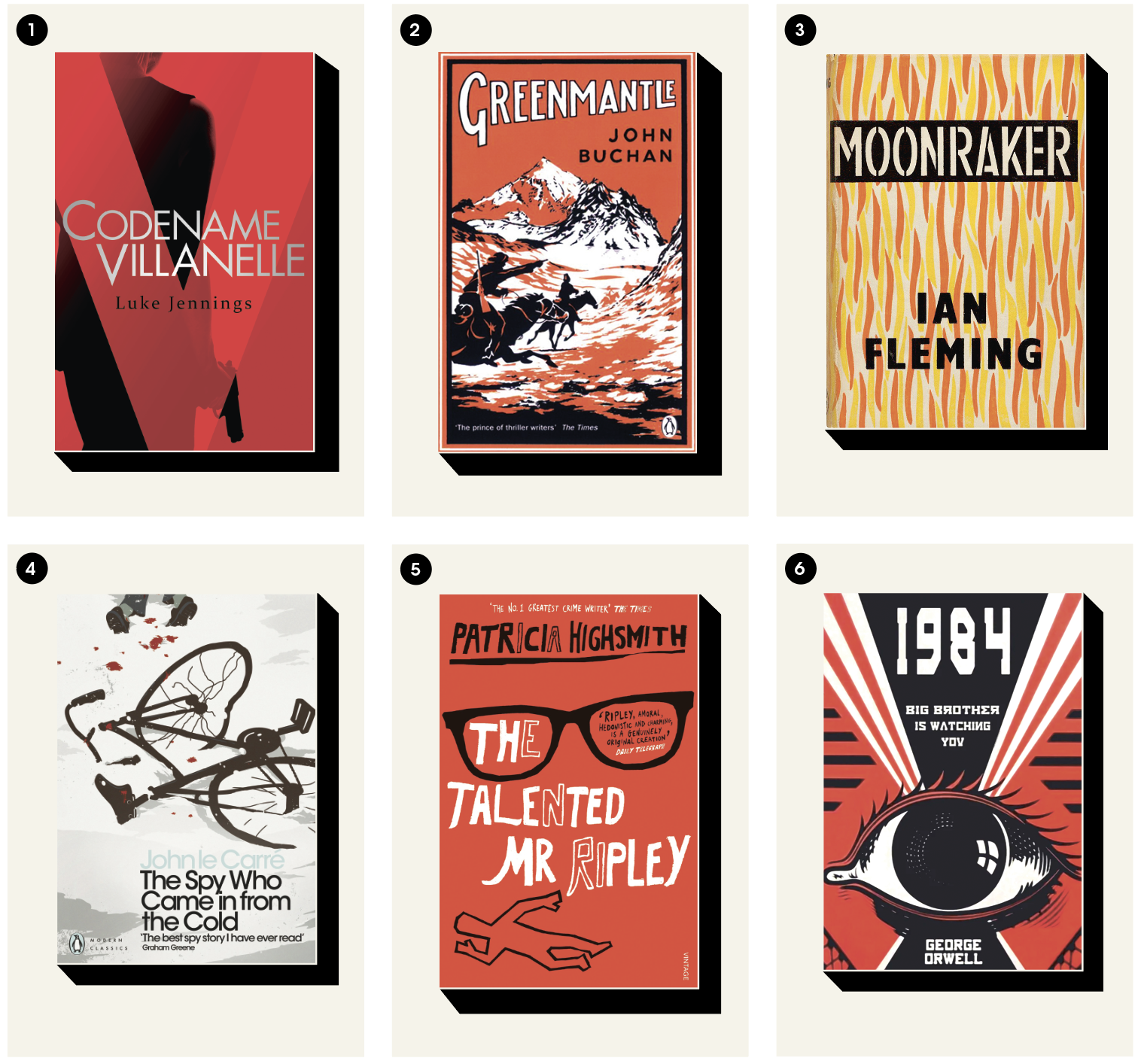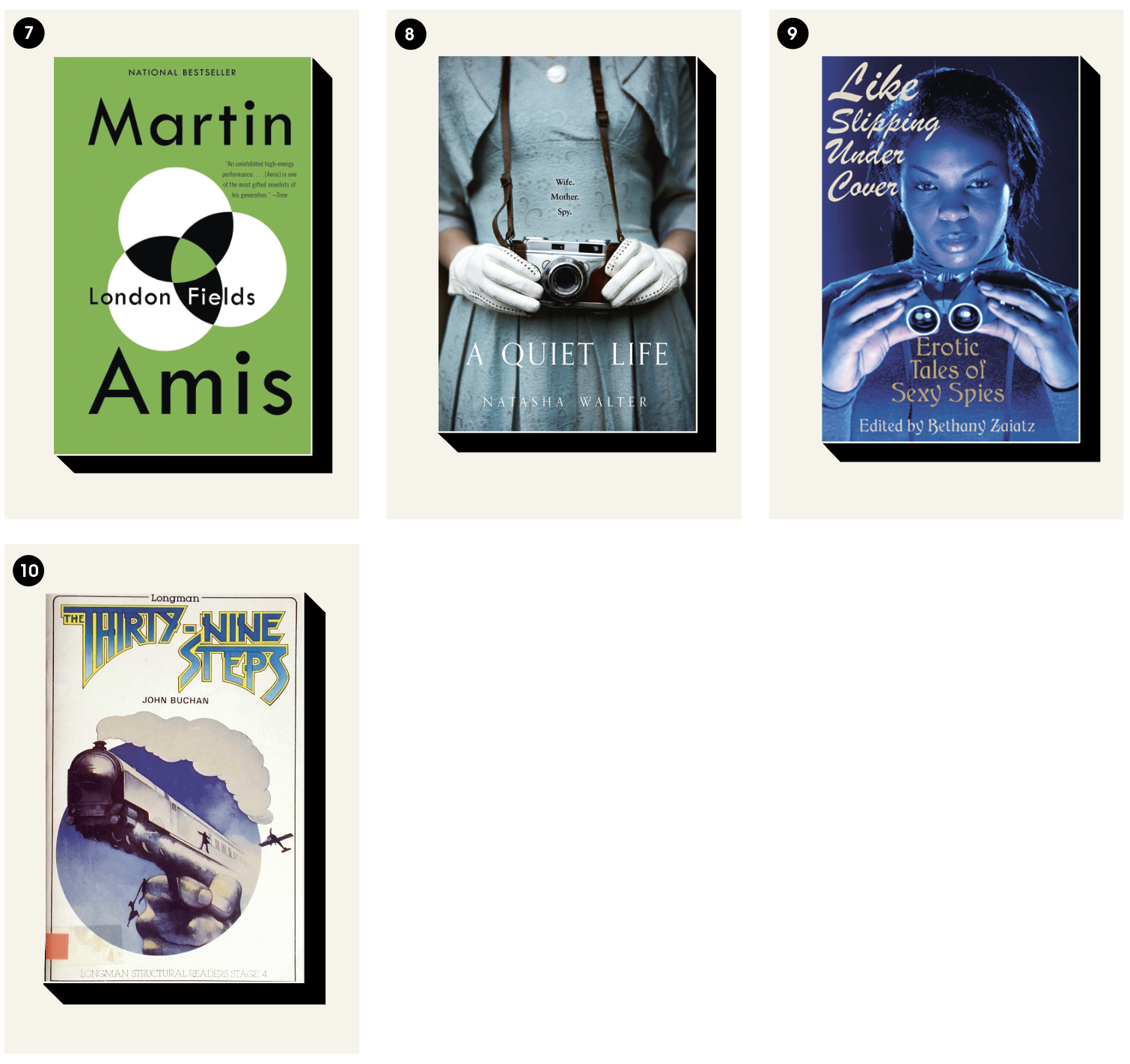The espionage novel facilitates a delicious sort of voyeurism, giving you access to the intimate and sometimes sordid details of another human’s life. How do you feel about meeting the spies who fall in love with the object of their obsessive stalking? Even if the sleuthing portrayed is entirely platonic, there is an erotic frisson to be found elsewhere. All the ingredients of a good spy thriller – tension, mystery, delayed gratification – double as spices for good lovemaking.
The spy novel is a place to resolve very tangible political anxieties. Many of my favourite ones were published in the years before and immediately after the Second World War, a period when spy fever peaked across Europe. Allied officers were warned about enemy female agents hiding cameras in their blouses, and M15 taught its operatives about the use of lemon juice and semen as secret inks. Hysteria was so intense that a ladies’ maid was strip-searched and then arrested at the German border, after a female police officer excitedly reported that the maid had ‘secret writing’ on her bottom. An arrest was made, the writing photographed and the prints sent to military intelligence. It turned out that the woman, worried that the train loo would be dirty, had covered the seat with her newspaper.
Luckily, fiction is usually less mundane than real life, and the reading recommendations that follow allow you to inhabit criminal and often fantastical underworlds, where femmes fatales are not a dream but a reality, and the average ladies’ maid might well have morse code written across her bottom. This is the great appeal of the espionage novel: you get to indulge in a little light roleplay. Suddenly, every glance is a secret code, just waiting for you to crack it, and every stranger is a potential assailant, or a future lover. Or both at the same time.

CODENAME VILLANELLE 1
Villanelle is a Russian assassin who has made a career out of murdering the world’s richest men. When the former M16 operative Eve Polastri is hired by the British national security services to hunt her down, an obsessive love affair begins between the two. Perhaps you are familiar with this story? There is a wildly successful BBC television series. On the show, Villanelle is eventually murdered and – even more frustratingly – Eve and Villanelle never actually have sex with each other. But if you dare to get lost in the book, the two women end up walking off into the sunset to live happily ever after.
GREENMANTLE 2
Set in the middle of the First World War, John Buchan’s Greenmantle tells the story of four spies who foil a German plot. Our hero, Richard Hannay, is almost distracted from his mission by Hilda von Einem, a ‘glamorous but merciless female agent’ with ‘a bosom that rose and fell in a kind of sigh.’ The description of the effect this sex-goddess has on the hapless men who stumble across her path makes for compulsive reading. ‘I hated her instinctively, hated her intensely, but longed to arouse her interest,’ says Richard. Few of us like to admit it, but hatred is often the precursor to desire.
MOONRAKER 3
Anyone who believes that the Bond girls are the sexiest thing about the 007 franchise would do well to revisit Ian Fleming’s novel Moonraker. The book contains a forensic description of a mole on the upper curvature of special agent Gala Brand’s right breast – but it is Fleming’s description of Bond’s own naked body that will really set your heart aflutter. Freshly showered, James pauses in front of the mirror to admire his own crotch: ‘Automatically he glanced down at his naked body and registered that the almost indecent white area left by his bathing trunks … he smiled.’
THE SPY WHO CAME IN FROM THE COLD 4
In John Le Carré’s most famous novel, we follow the fortunes of British agent Alec Leamas, who is sent to East Germany to sow disinformation. It is common in espionage thrillers for the female lover to be framed as a kind of femme fatale, tempting the hero away from the righteous path of duty with her feminine wiles. In this novel, love interest Liz Gold is an anathema to all that: her simplicity and unpretentious sensuality provide Leamas with his salvation. But in spy novels, as in life, the course of true love doesn’t always run smooth: Leamas and Gold’s romance has fatal consequences.
THE TALENTED MR. RIPLEY 5
Have you heard of the psychopath Tom Ripley? He infiltrates the life of his acquaintance, Dickie Greenleaf. While not an espionage novel in the technical sense (Mr Ripley is not a professional spy), much of the thriller’s erotic power comes from scenes in which Tom secretly watches his friend – at one point he crouches at a bedroom window to get a better view of Dickie and his girlfriend making love. The twist in this novel is the sexual attraction Tom himself feels for Dickie. When Tom is rejected, he does something we have all been tempted to do after experiencing sexual humiliation: he commits murder.
1984 6
It’s Madeleine Dunnigan, calling you from New York. One of the things that makes 1984 so compelling is the way Orwell writes about desire. Winston, who is at the centre of the novel, is beaten down by totalitarianism, but when he meets Julia, pleasure interferes with the system. The first time they have sex, it’s outside. They have to travel to the meeting spot via different routes, to avoid being spied on by the state. Winston doesn’t feel love necessarily; the sex is more a way of slyly doing something that is unobserved. By looking at each other sensually, they escape the watchful eye of Big Brother.

LONDON FIELDS 7
Hello, it’s Emily Bradleigh. How are you? London Fields is not a spy novel in the classic sense, nor is it particularly good. But it does, in a surprising way, draw us into a contemporary story of spying and voyeurism – the trial of Amber Heard. In the book, we see a two-dimensional, sexually rapacious femme fatale (Nicola Six) who has a hold on the men in her life until one of them kills her. We, the readers, sit alongside the novel’s narrator Samson Young, watching her sexual encounters, knowing that she will die. How strange that Nicola Six was played by Amber Heard in the ill-fated film adaptation, a woman also reduced to playing a manipulative seductress, a sensual liar – as the circus of the courts invited us to spy on her life with Johnny Depp, to gaze upon brutal events that she had not consented to being shared publicly.
A QUIET LIFE 8
Hi, Lucasta Millar here. Natasha Walter is best known as a feminist and activist. Her single novel, A Quiet Life, makes me wish she had written many more! Set between 1939 and 1953, it’s a Cold War thriller of espionage and betrayal written from a woman’s perspective. Laura, a naïve young American in England, falls in love with an upper-class Englishman who turns out to be secretly spying for the Soviets. Walter immerses you in the historical period and the psychological subtleties of being a woman in that world. She paints it in all its disillusioned seediness.
LIKE SLIPPING UNDERCOVER: EROTIC SPY FICTION 9
Adrian Pearson on the line, calling in from Kentish Town. I am a spy novel addict, and lately I’ve been reading an anthology of erotic spy fiction by contemporary authors. There is an interesting tension in all spy stories between romance as part of the game of espionage and romance as the thing that makes the spy go rogue and desert ‘queen and country.’ The coverline reads ‘sex and spies seem to go together like hands and leather gloves,’ which is cheesy but I love it!
THE THIRTY-NINE STEPS 10
Hi! It’s Simon Robson with a recommendation. In Hitchcock’s reworking of John Buchan’s novel, Robert Donat and Madeleine Carroll are handcuffed together as they flee both the police and foreign agents. Their intimacy is cemented through an hour of mutual irritation, exasperation and distrust: like living together during lockdown. If they can survive that, then they can survive anything. Set against the ugly world of European espionage, it seems to suggest that if you’re harbouring the same secret – even courtesy of the supreme double agent, Love – all is well.